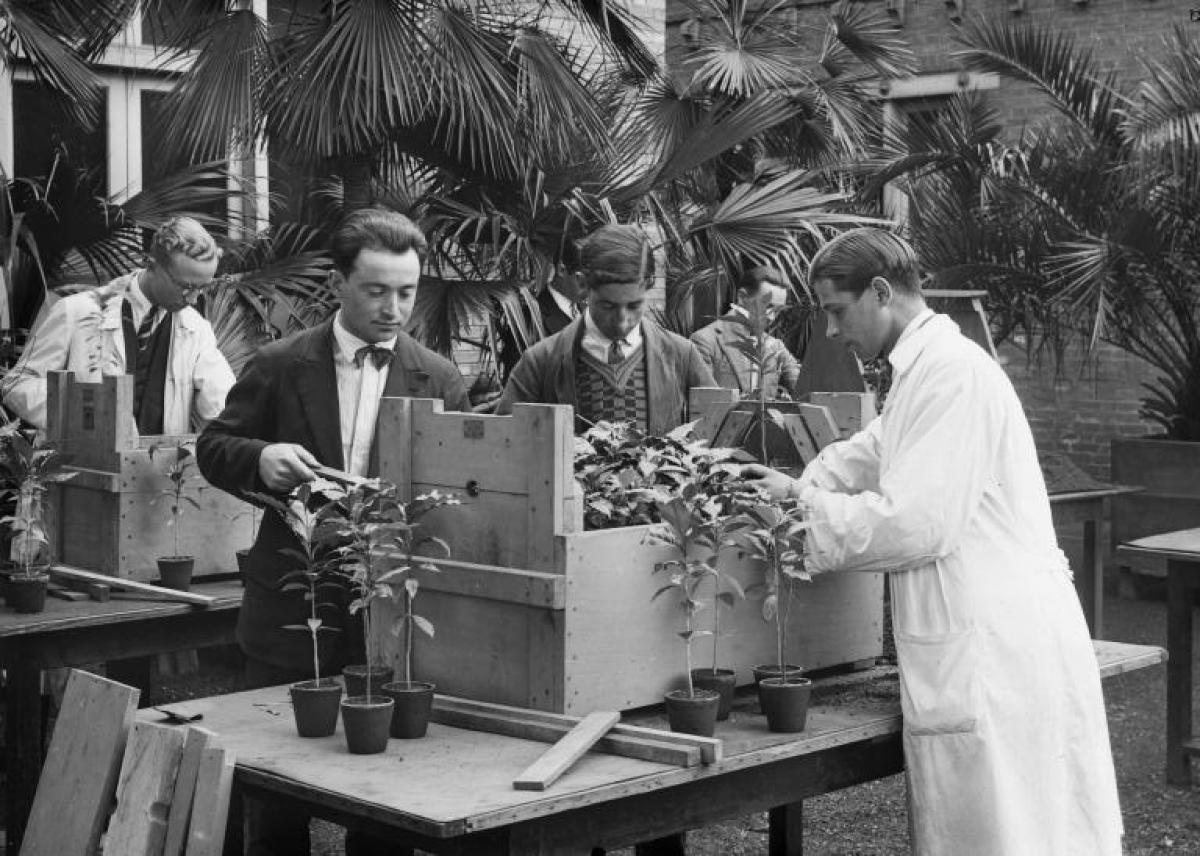- Home
- About us
- Our history

Our history
Test gardens and institutes: colonial times and the birth of French tropical agricultural research
In the late 19th century, following in the footsteps of the United Kingdom and the Netherlands, France decided to build a structure to coordinate activities in its colonial empire aimed at improving agricultural production. The colonial test garden in Nogent-sur-Marne, founded in 1899, received plants and seeds from the colonies that it planted and analysed in its laboratories. Worthwhile varieties were then propagated and despatched to the test gardens and experimental stations being set up at the time in the colonies. At the same time, specific teaching establishments were emerging in mainland France: tropical agronomy was becoming a scientific discipline in its own right.
Between 1920 and 1960, nine tropical agricultural research institutes were founded to boost knowledge and economic exploitation of tropical resources, focusing on the following: rubber (IRCA); oil crops (IRHO); fruit and vegetables (IRFA); cotton and exotic textiles (IRCC); coffee, cocoa and other stimulant crops (IFCC); livestock production and veterinary medicine in the tropics (IEMVT); tropical forestry (CTFT); tropical agricultural research and food crops (IRAT); and tropical agricultural machinery testing (CEEMAT). Their work centred on cash crops intended for export and for shipment to mainland France.
Decolonization and the rise of food crops
Following the Second World War, the institutes largely switched their attentions to cereals and other food crops. The aim was no longer to supply mainland France but to help French territories to feed themselves. The founding of the Institut de recherches agronomiques tropicales et des cultures vivrières (IRAT) in 1960 reflected this new ambition. One by one, colonial experimental stations, plantations and test gardens were handed over to newly independent States. The colonial economy gave way to technical support and scientific cooperation.
This was also the time of the Green Revolution. As the global population exploded, the boom in industrial farming multiplied agricultural production many times over. The revolution was built on four pillars: genetics, inputs, mechanization and irrigation.
Towards a new identity: CIRAD
Between 1960 and 1970, several types of reforms were considered for the institutes, with their very different remits, statuses and cultures. The ancestor of CIRAD, the Groupement d’étude et de recherche pour le développement de l’agriculture tropicale (GERDAT), was founded in 1970 to ensure more effective coordination.
CIRAD replaced GERDAT on 5 June 1984. The institutes were merged to form a Public Industrial and Commercial Establishment (EPIC), under the dual supervision of the Ministry of Research and the Ministry of Cooperation and Development. This was followed by a long period of change and of successive reforms to shape CIRAD into a modern scientific organization, forge new links with other agricultural research institutions worldwide, and profoundly reform the links carried over from the postcolonial period, notably with our African partners. This was a time of tensions, and even crises, but also of novel ideas for the new organization's scientific remit and ambitions.
"Science is central" and the 2006 major reform
Since its founding, CIRAD, as a scientific research and international cooperation player, has always sought to strike a balance between its two original remits. In the 2000s, however, it opted to err on the side of research, placing scientific excellence at the heart of its operations. The number of publications by CIRAD researchers and hosted PhD students skyrocketed. In terms of research planning, technical support programmes gave way to scientific departments and research units.
The 2006 reform was the culmination of the "CIRAD" project. The organization was now officially presenting itself as a research in partnership organization working on global public goods. This move was prompted by the realization that a structure centring on value chains, which had always been the backbone of the institution, did not enable it to either understand or support the production of global public goods: social development, wellbeing, or environmental and health issues. This major break with tradition resulted in a new internal structure and the creation of the current three scientific departments: "BIOS", for biological systems; "PERSYST", for technical systems; and "ES" for social and institutional systems. Partnerships have since been built around the main scientific issues, prompting the birth and development of platforms in partnership for research and training (dPs).
The integration of the whole range of disciplines also marked a switch from research for development to development through research. As the countries with which CIRAD works cannot rely on the transfer of knowledge and technology developed elsewhere, that knowledge and technology must be developed on the ground and tailored to local conditions, by building sovereign research capacity.
CIRAD is now at the heart of global agricultural research
The establishment of the CGIAR consortium's HQ in Montpellier in 2011 made the city the global agricultural research capital and confirmed CIRAD's position as a pioneering, key player in the sector. That position is steadily being consolidated by the spread of an impact culture throughout the organization.
CIRAD is now in a position to document the contribution made by its research to building resilient agricultural systems. Food security, biodiversity, the sustainable development goals, agroecology, and more… CIRAD's expertise shows more clearly than ever the pivotal role of agriculture in solving current economic, social, environmental and health issues.

























